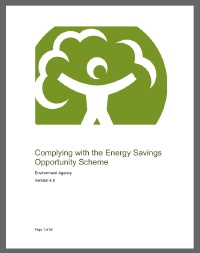As the ESOS deadline approaches...

Bill Wright of the Electrical Contractors’ Association thinks that the Energy Savings Opportunity Scheme should be one of the Government’s more successful energy-saving initiatives and shares his views on why it is a ‘good thing’.
On the face of it, ESOS (the Energy Savings Opportunity Scheme) should be one of the more successful of the Government's energy efficiency initiatives. Based on an EU directive, ESOS is fairly ‘light-touch’ legislation. Yes, it requires larger companies to carry out an energy audit, but, remarkably, it does not actually compel that company to do anything about the audit recommendations — whether action would save or cost money.
Yet a Freedom of Information (FoI) request from Veolia seems to suggest ESOS appears to be floundering. In late September the company claimed its request showed that only 150 companies had achieved ESOS compliance ahead of the deadline of 5 December 2015.
This situation became less worrying in October when the Environment Agency announced a change to the deadline for ESOS compliance, giving companies until 29 January 2015 to become fully compliant, as long as they notified the agency of their intention to complete by the original 5 December deadline.
This was a positive step, but does little to detract from the fact that very few firms were going to be ESOS-ready by the original deadline for compliance. That said, I'm not convinced the situation is as bleak as the data from Veolia would suggest.
 |
| The latest Government guidance on ESOS was updated in early October. Link below. |
The figures I've seen show that around 1500 of the 7500 eligible companies have already achieved compliance, and we should remember that ESOS is not the only way for companies to show compliance with the directive which it is based on. For example, a company may not need to undertake the ESOS assessment, which requires a ‘lead energy assessor’ if they are fully covered by ISO 50001, the Energy Management Systems Standard, and the Environment Agency’s announcement in October gave them until 30 June 2016 to achieve this.
But why have so few companies who need to take the ESOS route by law shied away from doing so?
My experience suggests that a number of businesses are under the impression that ESOS is voluntary, or even that it would be cheaper to pay a fine for not complying than it would be to carry out an energy audit. However, the proposed penalties are significantly more severe than have been widely assumed — and could run into hundreds of thousands of pounds when the costs of the initial and cumulative fines are calculated alongside the cost of carrying out an energy audit.
Another factor which is contributing to ESOS's struggle to take off is poor promotion. Responsibility for promoting the initiative has fallen to the Environment Agency, which has expended a tremendous amount of energy on raising awareness that the compliance deadline is fast approaching. Despite its efforts, the information doesn't appear to be resonating. The Environment Agency hasn't said who it is sending the letters and emails to, but I suggest we might find more firms rushing to achieve ESOS compliance if they had been sent to the managing directors or chief executives of the companies that qualify for it, and explained more clearly the prospect of fines and possible reputational damage, as the Environment Agency's right to publish the names of the those firms who have failed to achieve compliance is not as widely known as you might expect it to be.
ESOS could be a commercial bonus to building-services engineers —particularly those who have long-established relationships with clients, and who have a direct line to the decision makers within a business. Now is the time to remind them that the deadline for compliance is fast approaching, and to make them aware of the cumulative nature of non-compliance penalties. It’s also the time to tell them about energy efficiency, with or without ESOS.
 |
| Nothing that is done now to comply with ESOS will be wasted |
Yet ESOS should be ‘forcing the opportunity’ for large businesses to consider reducing their energy usage and their bills, and for building-services professionals to be part of the solution. It provides a legal impetus for firms to begin the process of becoming more energy efficient, but that's as far as it goes. If the Government were to offer grants to large firms to cover some of the costs of the recommended energy-efficiency measures it would make ESOS a more holistic process, as it would provide both a legal requirement to carry out an energy audit and some financial support to enact its recommendations — rather than one which merely requires firms to think about becoming more energy efficient. Sadly, this doesn't seem to be something Government wants to introduce as it has indicated a desire to stop subsidising energy-efficiency measures.
However, despite the Government's stance on this aspect of energy efficiency, it is looking to make changes to the wider policy framework which could strengthen ESOS.
A recent consultation from the Treasury stated that ESOS could be the foundation for any future framework for reporting energy consumption, which highlights that, despite the issues surrounding the initiative, it does have a future. Nothing that is done now to comply with ESOS will be wasted, and compliance can only put a company in a good place in terms of energy savings, future proofing, reputation, and legal compliance.
Bill Wright is head of energy solutions at the Electrical Contractors' Association (ECA).








